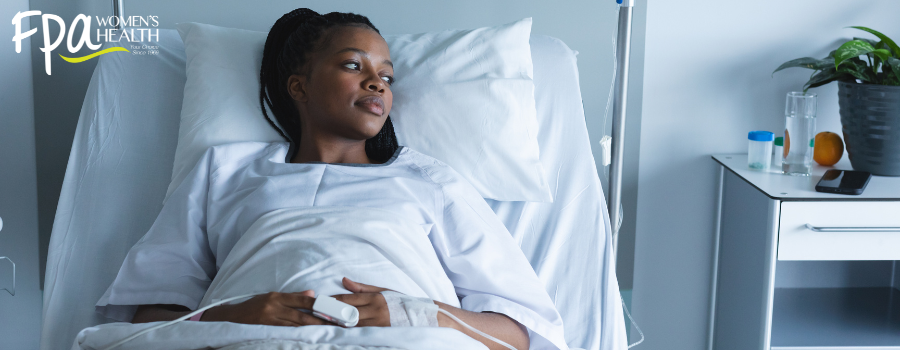
One in four women in the United States is expected to have an abortion. And while abortion is technically a common procedure, it is a deeply personal experience where the “healing process” takes on both emotional and physical meaning. Both are very important.
Here though, we are focusing on physical recovery after a surgical abortion—the pregnancy termination procedure usually performed beyond 10 weeks of pregnancy.
While the procedure is safe and effective, it’s completely normal to have questions about what to expect. Knowing how to care for yourself during this time can help you feel more at ease and support your healing process.
Immediate Recovery: What to Expect
After the procedure, you may feel tired or disoriented, especially if you receive anesthesia.
Surgical abortions usually take less than 10 minutes. However, you may feel like resting a while afterward. We take our patients to a calm and private recovery room to relax, and so we can monitor their pain and bleeding.
Common side effects
- Light to moderate bleeding, which can continue off and on for up to four weeks
- Cramping, similar to menstrual cramps, usually easing after a few days
- Breast tenderness or leaking, as pregnancy hormones take time to leave the body
- Fatigue, bloating, or headaches, which may last for a couple of weeks
Caring for Yourself During Recovery
While most patients would agree that the hard part is over, you'll still want to dedicate time and attention to proper recovery at home.
To promote healing after a surgical abortion, consider the following self-care tips:
- Monitor bleeding: Light bleeding is normal. However, if you soak through two or more sanitary pads each hour for two hours in a row, seek medical help. FPA patients should call our 24-hour nurse at (877)-883-7264 with any concerns.
- Get adequate rest: Avoid strenuous activities for a few days to allow your body to heal.
- Take prescribed antibiotics: Take the full dose with a meal. They may cause nausea or vomiting. It is alright if you throw them up but try to keep them down as long as possible. Even if you feel fine, completing the full course of antibiotics helps prevent infection.
- Watch for warning signs: Seek medical care if you experience severe pain, fever over 100.4°F, or persistent nausea and vomiting.
- Use sanitary pads instead of tampons: This helps reduce the risk of infection.
- Avoid baths and swimming: Stick to showers until your body has fully healed to prevent bacteria from entering the reproductive system.
- Replenish your body: Focus on hydration, eating nutritious meals, and getting plenty of rest.
Emotional Recovery and Mental Well-Being
While many people feel relief after an abortion, others may experience a mix of emotions, including sadness, anxiety, or guilt. Processing this experience in different ways is normal.
If you are struggling, consider speaking with a trusted friend, counselor, or support group.
Common Questions
 How Long After an Abortion Can You Have Intercourse?
How Long After an Abortion Can You Have Intercourse?
Wait at least two weeks before engaging in sexual intercourse after a surgical abortion. This waiting period reduces the risk of infection and allows the cervix, which remains slightly open after the procedure, to heal properly.
If you continue to experience heavy bleeding, discomfort, or signs of infection, such as fever or foul-smelling discharge, it is best to wait longer and consult your healthcare provider.
It is important to note that ovulation can occur as soon as two weeks after an abortion, meaning pregnancy is possible if contraception is not used. Many birth control methods, including the pill, IUD, or implant, can be started immediately after the procedure.
Can You Drink Alcohol After an Abortion?
It is best to avoid alcohol for at least 24 hours after a surgical abortion, particularly if you received sedation or pain medication. Alcohol can interfere with the body's healing process, cause dehydration, and worsen side effects such as dizziness, fatigue, or nausea.
If a doctor prescribes antibiotics, don't drink until you complete them. Drinking can reduce effectiveness and increase the risk of side effects such as stomach irritation or liver strain. Focusing on hydration, nutritious meals, and rest will support a smoother recovery.
When to Call Your Doctor

Contact your healthcare provider if you experience any of the following symptoms:
- Heavy bleeding that soaks two pads per hour for two consecutive hours
- Severe abdominal pain that is not relieved with medication
- Fever lasting more than four hours
- Foul-smelling discharge, which may indicate an infection
By following medical guidelines, monitoring your symptoms, and seeking support when needed, you can help ensure a safe and healthy recovery. FPA patients are encouraged to read our detailed and downloadable Surgical Abortion Guide.
If you are pregnant and do not wish to be, we encourage you to make an appointment at your nearest FPA location.
Share This
Get Help Now